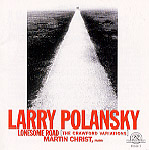Bach’s Goldbergs and Beethoven’s Diabellis either have intimidated or seduced composers into trying their hands at writing piano variation sets of unusually long duration. Recent examples include Frederic Rzewski’s The People United Will Never Be Defeated!, Ralph Shapey’s Fromm Variations, and William Schimmel’s monumental 50 Improvisations on a Lullaby by Brahms. These all clock in between 45 and 70 minutes. In its uncut form, Larry Polansky’s Lonesome Road (the Crawford variations) plays for nearly an hour and a half.
To accommodate the work on one disc for this premiere recording, a few variations had to be omitted. That’s akin, in this case, to removing a quart of water from the Dead Sea. Nobody notices except the composer, the pianist (hopefully), and God. Polansky uses Ruth Crawford’s harmonization of the folk song “Lonesome Road” as a jumping-off point to engender 51 small sections organized into three larger ones. It’s difficult to absorb the work’s overall architecture within the first several hearings; perhaps an attempt to describe the music’s surface style will suffice for now.
Polansky’s variations usually behave like paraphrases, where the original tune distorts, changes shape, disappears, or peeks out from behind in the form of a reminder card. Fantasy-like variations constructed from spiky, stringy piano runs and angry Charles Ives chords lead into reposeful chorales. The structure if not the sound of Gamelan music informs several variations. Rhythm is often complex and generated by intellectual rigor. This works best in abstract or aggressive sections, like the petulant, jumpy 28th Variation, but less well when Polansky editorializes rather than indulges his innate lyrical instincts. When he simply sits down and writes unbuttoned tonal music, as he does in the “Phantasy” Variation 22, a genuine pulse emerges and moves the plot forward. On the other hand, his pastiche-type variations are laden with too much side commentary and overhead baggage to make their intended effect, like the clunky Waltz (Variation 44).
More often than not, I find much of the music operates on the same emotional level for large stretches. Perhaps this has something to do with the pianist. Martin Christ certainly plays all the notes, but with little dynamic contrast and sense of danger. In an ideal world I’d want the loud, explosive chordal sequences to resonate in your face, the wide-register melodic leaps to hit like daggers, and the ragtime allusions to swing more. If you are familiar with the aforementioned Rzewski opus, or perhaps Ronald Stevenson’s Passacaglia on DSCH, you’ll turn a sympathetic ear to Polansky’s magnum opus. I’m still coming to terms with this work, though, so my jury remains out for now.
































